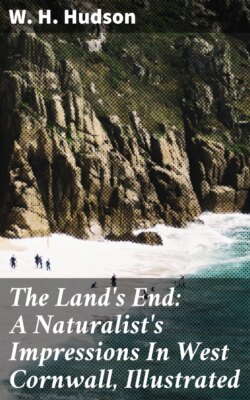Читать книгу The Land's End: A Naturalist's Impressions In West Cornwall, Illustrated - W. H. Hudson - Страница 11
На сайте Литреса книга снята с продажи.
Original
ОглавлениеOne day I caught sight of a large ivory-white gull of an unknown species sitting on the water some distance from the shore, and was very anxious to see more of this bird. Two or three days later I was with an artist friend in his studio, and was standing at the window which looks upon a sandy cove at the back of the town. By and by a wave of the incoming tide threw up a dead dogfish about three feet long on the white sand within fifty yards of the window. Scarcely was the fish left by the retiring water before a big white-winged gull dropped down upon it—the very bird I had been hoping to encounter again! There it remained, trying to tear a hole in the tough skin, fully five minutes before the returning water took the fish away, so that I had a good chance of examining it through a binocular. It was considerably bigger than the herring gull, with a much more formidable beak and altogether a bolder appearance, and the entire plumage was of a chalky white. It was a Glaucous gull—the famous Burgomaster of the Arctic Sea, probably a female in immature plumage. In a few moments other gulls dropped down to get a bite—three herring and one black-backed gull with some smaller gulls—but they were not allowed to taste the fish. When one attempted to come near it the white gull looked fixedly at him a couple of moments, then drawing in its head suddenly tipped its beak upwards—an expressive gull gesture corresponding to the snarl of a dog when he is feeding and other dogs approach him. It produced a marked effect on the other gulls; perhaps the Burgomaster, a rare visitor to our seas, was known, from hearsay, to them as a great tyrant.
Talking of this noble stranger to one of the fishermen, I remarked that if a bird collector happened to be about he would certainly have that bird even if compelled to fire into the whole crowd of gulls to kill it. "Then," he returned, "perhaps our men would kill him!"
The curious point is that this feeling should exist and be so strong in a people who have little or no regard for birds generally. The most religious of men, they are at the same time the least humane. The gull they tell you is the fisherman's friend; but other sea-birds, which he kills without compunction—the gannet, for instance—are useful to him in the same way as the gull. They also say that the gulls keep the harbour sweet and clean; an explanation probably invented for them by some stranger within their gates. The fact is, they cherish an affection for the gulls, though they refuse to confess it, and, being what they are by race, this feeling has acquired the character of a superstition. To injure a gull wilfully is to invite disaster. It may be that the origin of the feeling is simply the fact that gulls gather in vociferous crowds round the boats and in the harbour when the fishing has prospered, and in this way become associated in the fisherman's mind with all those agreeable ideas or images and emotions connected with a good catch—smiles and cheerful words of greeting in the home, with food in abundance, money for the rent and for needed clothes and other good things for the little ones.
On the other hand we may have here a survival of an older superstition, a notion that gulls are in some degree supernatural beings, perhaps drowned mariners and fishermen returned in bird forms to haunt their ancient homes and associate with their human fellow-creatures. The feeling is certainly very strong: I was told that some of the fishermen even in their times of greatest scarcity will always manage at mealtime to put a few crusts and scraps of food into their pockets to throw to the gulls in the harbour.
